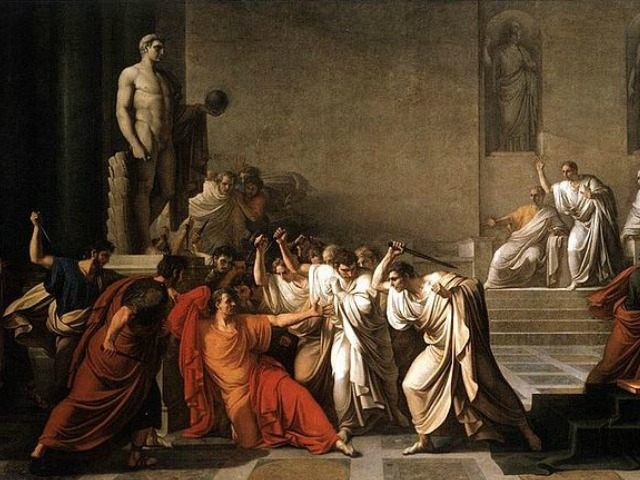“A soothsayer bids you beware the Ides of March,” Brutus warns Roman dictator Julius Caesar in Shakespeare’s timeless tragedy. March 15 is the “Ides of March,” one of the most important events in the political history of western civilization, the anniversary of Julius Caesar’s assassination.
In 44 B.C., the Roman Republic was declining into empire. Five years earlier, Caesar’s army had crossed the Rubicon River and marched into Rome, which was strictly forbidden by law. Do students learn this history anymore?
These days, national testing data tell us that American students’ civic knowledge is in free fall. On the civics portion of the 2010 “Nation’s Report Card,” the 12th grade results were mediocre and unchanged since 1998. Previous generations shaped the future by studying the past.
Defying Rome’s constitution, Caesar established himself perpetual dictator, schemed to become king, and was even made a living god. Like Americans, Romans had a visceral disdain for heavy-handed monarchs. Their deliberative Senate and civic vigilance are why Rome’s republic had lasted over 450 years.
America’s founders were steeped in classical history, oratory, and English literature. They considered ancient Rome’s constitution, heroes, and villains, to be models and anti-models of statecraft. Roman terms like republicanism, federalism, senate, and governor, are all deeply embedded within America’s experiment in ordered liberty.
Massachusetts’ John Adams, who helped lead us to independence from Great Britain, wrote, “Caesar, by destroying the Roman Republic, made himself a perpetual dictator; [Massachusetts Governor] Hutchinson, by … supporting a System of Corruption and Tyranny, has made himself Governor.”
In 2009, Governor Deval Patrick, claiming prohibitive costs, postponed a requirement that Massachusetts public-school students pass a basic U.S. history MCAS test to graduate.
A year later, state education commissioner Mitchell Chester killed off the commonwealth’s classic literature- and drama-rich English standards. He replaced them with academically weaker national standards, the Common Core, which slashes classic literature by 60 percent.
Massachusetts’ previous standards made our students the best in the country and internationally competitive. Now, under a degraded definition of “college readiness,” schoolchildren will get little or no history and significantly less literature.
Yale historian Ramsay MacMullen’s book, Corruption and the Decline of Rome, correlates the decline of literature with the decline of Rome itself. “Why did literature,” he asks, “like a canary in a coal mine, die first?”
In 2009, the U.S. Department of Education incentivized states’ adoption of the literature-lite Common Core, while in 2013 it indefinitely postponed the national civics test for America’s students.
The ultimate question about the decline of history in our public schools is this: will our schoolchildren have the basic civic knowledge for our public institutions to endure?
As Rome devolved into autocratic rule, Caesar and his henchman Mark Antony stifled dissenters and used violence for political ends, while cursing senators like Cato, Cicero, and Brutus, whose fiery speeches spoke truth to power.
Although Shakespeare’s play is called Julius Caesar, its hero is the high-minded patriot, Brutus, who previously had been close to Caesar. Stooping under the will of this tyrant-god, Brutus led the dissenters to stab Caesar to death in the Senate. Caesar’s dying words, “Et tu, Brute?” mean, “And you too, Brutus?”
“If there be … any dear friend of Caesar’s, to him I say, that [my] love to Caesar was no less than his,” says Shakespeare’s Brutus. “If then that friend demand why Brutus rose against Caesar, this is my answer — Not that I loved Caesar less, but that I loved Rome more.”
As often seen in Shakespeare, a self-destructive cycle of violence ensues. In both the drama and human history, this civil war ends with Caesar’s men hunting down Brutus and his compatriots.
Thankfully, these ancient lessons motivated our founders to craft modern constitutions exalting the rule of law and natural rights over violence. Today, Americans resolve political strife in the voting booth or with a stroke of a pen, not the stab of a sword.
“This was the noblest Roman of them all,” Shakespeare says of Brutus. “His life was gentle, and the elements So mix’d in him that Nature might stand up and say to all the world, ‘This was a man!’”
If American education needs inspiring words to restore civics in schools, let it start here.
Jamie Gass is director of the Center for School Reform at Pioneer Institute, a Boston-based think tank.

COMMENTS
Please let us know if you're having issues with commenting.